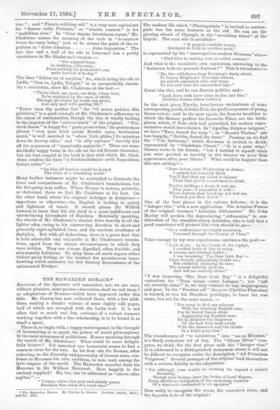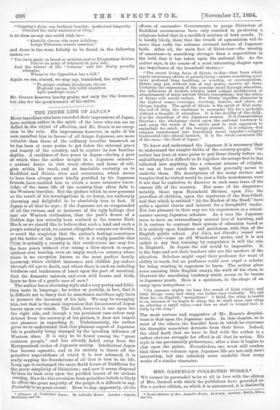THE HAWARDEN HORACE.*
READERS of the Spectator will remember, not, we are sure, without pleasure, some poems—travesties, shall we call them? or adaptations of Horace—which have appeared under this title. Mr. Graves has now collected them, with a few addi- tions, making a slender volume of some eighty odd pages, half of which are occupied with the Latin text. It is not often that so much real fun, outcome of a robust humour working together with a fine scholarship, is to be found in so small a space.
There is, to begin with, a happy extravagance in the thought of incarnating so to speak, the prince of social philosophers, in the most strenuous of politicians. Horace speaking through the mouth of Mr. Gladstone ! What could be more delight- fully bizarre? Yet somehow our humourist seems to find a common term for the two. In his first ode the Roman, after reflecting on the diversity and perversity of human aims, con- fesses to Msecenas his own ambition, to take rank among the lyric singers of the world. The Hawarden moralist finds his Msecenas in Sir William Harcourt. How happily is the analogy supplied I He, too, can be addressed as " atavis edite regibus " :—
" Vernon, whose lion port and stately grace
Proclaim thee scion of a royal race."
• The Hainariten /foram By Charles L. Graves. London: Smith, Elder, Rad. Co. 1854.
The modern life which " Plantagenista " is invited to contem- plate has the same features as the old. He can see the glowing wheels of Olympia in the "scorching wheel" of the' bicycle. The man who is satisfied- " Si proprio condidit horreo Quidquid de Lihycis verritur areis,"
is represented by the "unscrupulous modern Homers," who— "Find bliss in making corn or cotton corners." And what is the moralist's own aspiration, answering to the " doctarum hederae praemia fontium P" This is his answer:— " Me, late withdrawn from Downing's dusty street, To breezy Brighton's Tusculan retreat, An ardent aspiration stirs and sways To win and wear the unawarded bays."
Grant him this, and he can dismiss politics, and-
" Look down with brow elate on Sun and Star." (Sublimi feriam sidera vertice.)
In the next piece, Pyrrha, treacherous enchantress of some unsuspecting youth, is fickle Erin, the perilous passion of young Home-rulers ; and in the next again, the famous localities to which the Roman prefers his favourite Tibur, are the birth- places which, if Fate only had permitted, his modern repre- sentative would have chosen. In "Apolline Delphos insignes," we have "Tars, famed for song " ; in " Baccho Thebas," not less happily, " Dublin, famed for stout." Passing on, we find the "Vile Sabinum," which Manenas is invited to drink, represented by "Gladstone Claret." "It is a poor wine," Horace wrote to his friend ; "but I bottled it myself when you were greeted so heartily in the theatre on your first appearance after your illness." What could be happier than this new setting ?—
" Dear Acton, next Wednesday at dinner, I cannot but honestly think
You'll find that my claret is thinner Than that you're accustomed to drink.
Twelve shillings a dozen it cost me,
That year—I remember it well—
When Oxford, that loved me yet lost me, Created you Hon. D.C.L."
One of the best pieces in the volume follows ; it is the "Integer vibe," with a new application. The Aristius Fuseus of the original becomes "Aristides Obfuscates." Mr. John Morley will pardon the depreciating " obfuscatus," in con- sideration of the complimentary Aristides, who is told that a good conscience will protect him even should he go-
" On a midsummer moonlight excursion, Unarmed through the County of Clare,"
Take courage by my own experiences, continues the poet
"Look at me. As the breeze of the zephyr, I strolled forth of late to enjoy, A vicious and virulent heifer—
I was humming The Dear Irish Boy '- Came fiercely galumphing beside me ; But suddenly changing its tone, The animal amiably eyed me, And loft me severely alone."
"I was humming The Dear Irish Boy ' " is a delightful equivalent for "Dam meam canto Lalagen " ; but "left me severely alone" is, we may venture to say, inappropriate
and poor. In the " Persicos odi" the puer (Cyrillus Flosoulus) is warned, as was his Horatian prototype, to leave the rose alone, but not for the same reason : —
"Nor essay to deck my raiment With the blushing English rose,
For its brutal Saxon odour Aggravates my Scottish nose. Me as Minister the fragrance Of the leek cloth most arride
With the shamrock and the thistle In a triple posy tied."
The transference of " te ministrum " into "me as Minister," is a finely audacious bit of fun. The " Otium Divos " com- petes, we think, for the first place with the "Integer vita)." It is addressed to a distinguished statesman whom it will not be difficult to recognise under the description," Ad Primulam Vulgarem." Several passages of the original lend themselves with a curious felicity to the adaptation.
"For although your wealth be teeming far beyond a miser's
dreaming, Though your lackeys have the lustre of Lord Mayors, Pomp affords no mitigation of the eankering vexation
Of a democrat condemned to sit upstairs.'
How easily we recognise the gazes, the cons lames listor, and the Eapeata tecta of the original
"Canning's doom was brilliant brevity ; ineffectual longevity Obscured the early eminence of Grey,"
is as close as any one could wish to- " Abstulit clarum cite. mors Achillem, Longs Tithonum minuit senectus," and there is the same felicity to be found in the following stanza e•-• " You have parks as broad as prairies, you've Elizabethan dairies, You've an army of retainers at your call;
And the winner of the ' Guineas ' and the Derby proudly whinnies,
Whene'er the Opposition has a fall."
Again we see, almost, we may say, translated, the original :— " Te greges centum Siculaeque circum Mugiunt vaccae, tibi tollit hinnitum Apta quadrigis equa."
Mr. Graves deserves hearty praise, not only for the humour, but also for the good-humour of his satire.



















































 Previous page
Previous page